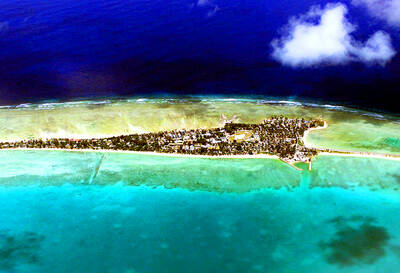Salvadorans who live in the US cannot vote in their native country, but they could affect the results of today’s presidential election because of the influence they wield over their relatives who value both their experience and the money they send.
“Potentially, the people who send remittances have a privileged status over those who receive the remittances, who could listen to the political message that their family members want to give them,” said sociologist Gaspar Rivera-Salgado, professor of immigration and labor at the University of California, Los Angeles. “It’s an interesting political exercise — an indirect influence.”
Concepcion Guerrero of San Salvador has a son in Los Angeles who sends her about US$100 a month. Although she said she makes her own decisions on how to vote, she acknowledged she listens to her son’s opinion.

PHOTO : AFP
“We value what he sends to us, for the sacrifice that he made to emigrate and get work over there,” Guerrero said by telephone from her home.
She said she plans on voting for the candidate of leftist party Farabundo Martí National Liberation Front (FMLN), Mauricio Funes, because she wants a change. Her son is also a staunch member of the FMLN.
Some experts believe a huge number of other voters will be influenced by the people who send money back home.
El Salvador received US$3.787 billion in remittances from the US last year, the Central Reserve Bank of El Salvador said. That represents 17.1 percent of the Central American country’s GDP.
The US Census Bureau said that 474,342 Salvadorans live in the US, with 394,107 living in Los Angeles. But Carlos Hinojosa, administrator of the Americas program at the Washington-based International Foundation for Electoral Systems, estimates the total number of Salvadorans in the US is about 3.2 million — equivalent to about 45 percent of El Salvador’s population of 6.6 million.
Both Funes, who polls have indicated is in the lead, and his main rival Rodrigo Avila, of the incumbent Arena party, have campaigned in the US seeking that “boomerang vote.” Funes has visited the US four times, Avila twice.
“Salvadoran politics has moved beyond the borders of the country,” said Rivera-Salgado, who is also researcher and project director of UCLA’s Labor Center. “This is a reflection of the Salvadoran diaspora. The candidates come to say that they will govern not only for Salvadorans in their country, but also for those in the diaspora.”
El Salvador has been a close US ally and rightists say a leftist victory could affect the country’s relationship with Washington. The FMLN has tried to allay any such fear.
“People want change in the United States and they want change in El Salvador,” said Jose Magin Parada, FMLN’s coordinator for Southern California.
It’s noteworthy, nevertheless, that the Salvadoran diaspora includes numerous leftists who fled their country during its civil war.
The possible influence of US Salvadorans in the elections is a singular phenomenon, which probably does not occur with immigrants from any other Latin American country.
Presidential candidates throughout the region are increasingly paying more attention to their overseas compatriots, especially those in the United States, but none has given their expatriates as much weight as Salvadorans, including Mexico, which has many more emigrants than El Salvador.
“You can’t compare El Salvador to Mexico, which has a population of 105 million and some 12 million here [about 11 percent of the population], while El Salvador has a greater proportion,” said Rivera-Salgado.
In Mexico, remittances represent approximately 2 percent of GDP.

DISASTER: The Bangladesh Meteorological Department recorded a magnitude 5.7 and tremors reached as far as Kolkata, India, more than 300km away from the epicenter A powerful earthquake struck Bangladesh yesterday outside the crowded capital, Dhaka, killing at least five people and injuring about a hundred, the government said. The magnitude 5.5 quake struck at 10:38am near Narsingdi, Bangladesh, about 33km from Dhaka, the US Geological Survey (USGS) said. The earthquake sparked fear and chaos with many in the Muslim-majority nation of 170 million people at home on their day off. AFP reporters in Dhaka said they saw people weeping in the streets while others appeared shocked. Bangladesh Interim Leader Muhammad Yunus expressed his “deep shock and sorrow over the news of casualties in various districts.” At least five people,

ON THE LAM: The Brazilian Supreme Court said that the former president tried to burn his ankle monitor off as part of an attempt to orchestrate his escape from Brazil Former Brazilian president Jair Bolsonaro — under house arrest while he appeals a conviction for a foiled coup attempt — was taken into custody on Saturday after the Brazilian Supreme Court deemed him a high flight risk. The court said the far-right firebrand — who was sentenced to 27 years in prison over a scheme to stop Brazilian President Luiz Inacio Lula da Silva from taking office after the 2022 elections — had attempted to disable his ankle monitor to flee. Supreme Court judge Alexandre de Moraes said Bolsonaro’s detention was a preventive measure as final appeals play out. In a video made

It is one of the world’s most famous unsolved codes whose answer could sell for a fortune — but two US friends say they have already found the secret hidden by Kryptos. The S-shaped copper sculpture has baffled cryptography enthusiasts since its 1990 installation on the grounds of the CIA headquarters in Virginia, with three of its four messages deciphered so far. Yet K4, the final passage, has kept codebreakers scratching their heads. Sculptor Jim Sanborn, 80, has been so overwhelmed by guesses that he started charging US$50 for each response. Sanborn in August announced he would auction the 97-character solution to K4

SHOW OF FORCE: The US has held nine multilateral drills near Guam in the past four months, which Australia said was important to deter coercion in the region Five Chinese research vessels, including ships used for space and missile tracking and underwater mapping, were active in the northwest Pacific last month, as the US stepped up military exercises, data compiled by a Guam-based group shows. Rapid militarization in the northern Pacific gets insufficient attention, the Pacific Center for Island Security said, adding that it makes island populations a potential target in any great-power conflict. “If you look at the number of US and bilateral and multilateral exercises, there is a lot of activity,” Leland Bettis, the director of the group that seeks to flag regional security risks, said in an